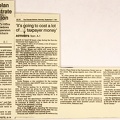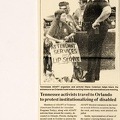NOVEMBER-DECEMBER 1991
DISCLOSURE/5
NEIGHBORHOOD BY NEIGHBORHOOD!
[Headline] ADAPT Hits Nursing "Home" Lobby in Orlando
ORLANDO, FL.--When Health and Human Services Secretary Luis Sullivan refuses to meet with you, what do you do? If you are an ADAPT (American Disabled for Attendant Programs Today) activist you take your grievance from the public to the private sector.
From Sunday October 6th. to Thursday October 10th. 450 ADAPT activists from 25 states converged on the Annual Convention of the American Health Care Association (AHCA), the nation's largest nursing home lobby.
The lack of a national policy to fund attendant home care services for people with disabilities is ADAPT's issue.
ADAPT was targeting the AHCA directly with their proposal to redirect a minimum 25% of Medicaid's $23 billion budget to establish a national program of community-based attendant home care.
ADAPT targeted the AHCA because of HHS Secretary Louis Sullivan's refusal to meet with ADAPT representatives to work out a comprehensive attendant home care program ADAPT's grievance to the AHCA is that its lobbying on behalf of the nursing "home" industry serves to keep disabled citizens that would be able to live in a home environment trapped in an institutional environment. A disproportionally larger share of the Medicaid budget goes to nursing homes instead of community-based programs such as attendant home care.
"The AHCA represents 95% of the 10,000 nursing homes in the U.S. Together, these institutions collect 6C% of their income from Medicaid. They end up making a profit from people's disabilities," explains Mike Auberger, with Denver ADAPT.
Until Louis "Dr. NO" (nicknamed because of his continuing refusal to meet with ADAPT) Sullivan makes time to meet with disabled citizens, ADAPT will continue to battle the nursing home industry on their own. Auberger continues, "These people are not cattle that you can charge so much for. We'd like to get rid of the profiteering and instead provide a creative humane system in people's homes."
ADAPT activists were attempting to block the entrances to Orlando's Peabody Hotel & Convention Center with their wheelchairs when the Orlando Police Department intervened. The OPD had busses equipped with lifts brought in to arrest any demonstrator that attempted to block the en-trances to the convention center. And arrested they were.
On Sunday 73 ADAPT activists were arrested and imprisoned in accessible cells. Most were arrested for attempting to block the entrances to the convention center, however many were
[boxed text] "The money should follow the people. When it comes to nursing homes, the people want out Attendant home care is the solution," Mark Jackson, Atlanta ADAPT.
[image]
[image caption] In lieu of HHS Secretary Luis "Dr. NO" Sullivan, ADAPT activists march to the Orlando convention center to challenge the nursing "home" industry lobby. (Photo by Tom Olin)
[text resumes] also arrested for blocking the arrival and departure of the lift-equipped buses. The activists, many of which are low-income, refused to post the $1,000 bail and were finally released on Friday.
By blocking the door and refusing to pay the bail, the activists were illustrating to the convention-goers the plight of residents trapped in the almost prison-like conditions in nursing homes.
The demonstrations and the subsequent arrests brought the issue of attendant home care to the forefront of the nursing home industry and the general public.
Mark Jackson, with Atlanta ADAPT, described the media situation. "Every time we do an action in a new city, we get more people involved. This was the first time ADAPT hit Florida. Everyone in the general public can relate to nursing homes, they know someone, family or friend, that has been put in a nursing home. These people can relate to the fact that people don't want to be institutionalized."
Auberger agrees, "There are 2 million people in Orlando that now under-stand the issue. This is a population that has an opinion, and that makes a difference."
The attendant home care issue is actually very simple according to ADAPT. A disproportionate amount of the budget for disabled citizen's services goes to funding the nursing home industry instead of attendant health care. For every person you can [text cuts off] to in a nursing "home", you can provide attendant home care for two in the community. Attendant home care is a cost effective way of providing disabled citizens with a stable home environment, one with dignity, instead of forcing them them to languish in a nursing "home".
According to ADAPT, there are 1.6 million disabled citizens that remain "imprisoned" in the nursing "home" system that could be living fuller lives in their own homes.
The fundamental debate centers on the quality of life for disabled people. Quality of life is higher for those who remain at home, with an attendant assisting them with household maintenance. Nursing "homes" resemble prisons, in numerous ways, most importantly in that residents do not have control over their own lives, in terms of eating, sleeping, recreation, etc. It is this lack of control that damages the self-esteem, dignity, and reduces the quality of life for the disabled.
Thousands of people with disabilities, old and young, are locked away in institutions and nursing homes or trapped at home because no effective community options exist. For thousands of other people with disabilities, the fear of being placed in a nursing home or some other institution is an everyday reality. It doesn't matter the age or disability, race or sex, whether employed or not, institutions for many are the only option.
"The AHCA says that we don't want to negotiate, that we don't want to meet. Well, ADAPT is not going to have a meeting for the sake of having a meeting. We sent them our '25%' proposal, and we gave them a resolution to vote on at their convention. They refused to discuss either one. Until they are willing to sit down at the table and hold a serious discussion on our proposals or their own alternative, we're going to keep the heat on," maintains Jackson.
ADAPT maintains that the nursing "home" industry has too much influence over how services are delivered, Disabled people are treated like commodities by a corporate nursing "home industry that is more concerned with profit than need. There is an institutional bias in most privately and publicly funded programs. The majority of funding is being spent for nursing homes and other institutions because of the influence of the American Health Care Association and other lobbying groups.
"When you take a look at the budget to provide long-term services to the disabled community...most of the money goes to institutions. Why is that? The nursing 'home' lobby is very powerful, and that pressure keeps the money flowing into the nursing 'home' industry. People are forced to follow. the money, and we want this to change. The money should follow the people, and the people want out," concludes Auberger.
ADAPT pledges to continue to demonstrate for attendant home care until all of the disabled citizens that can be removed from the oppressive nursing "home" industry are returned to their homes and provided with attendant home care.
ADAPT will also continue to press HHS Secretary Sullivan for a meeting to present their "25%" attendant home care proposal.
- Δημιουργήθηκε στις
- Παρασκευή 12 Ιούλιος 2013
- Αναρτήθηκε στις
- Παρασκευή 9 Νοέμβριος 2018
- Λευκώματα
- Επισκέψεις
- 399
- Βαθμολογία κατάταξης
- χωρίς βαθμό
- Βαθμολογήστε τη φωτογραφία


0 σχόλια